1. Why Learning Auto Repair Skills is a Good Option
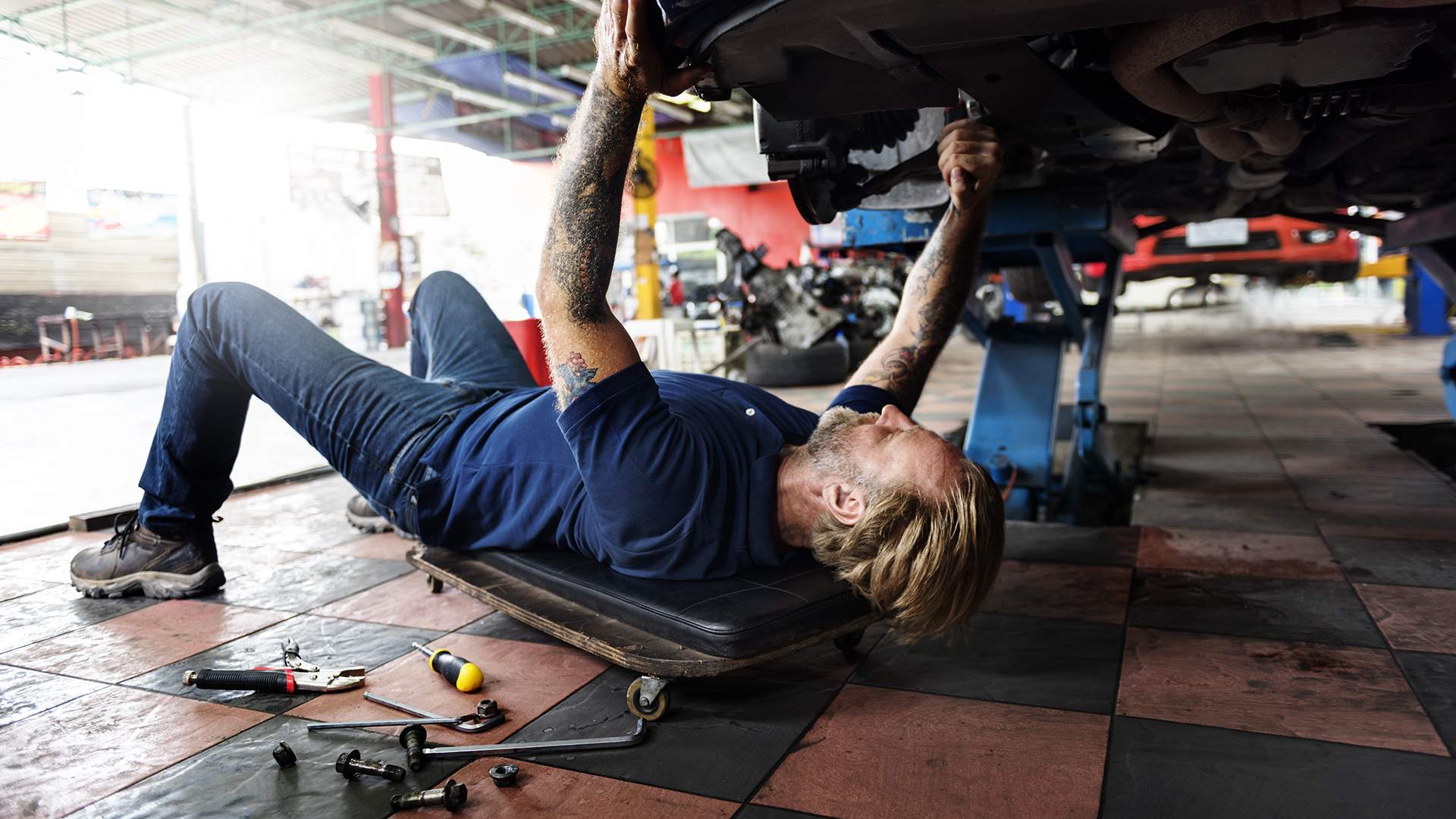
The need for vehicle repair abilities is fast expanding, particularly among persons wishing to save money while also gaining a thorough grasp of how cars work, and self-taught auto repair is becoming more popular. Whether you’re a car owner, a car enthusiast, or a newbie wanting to break into the automobile repair sector, learning fundamental auto repair skills can give significant personal and professional benefits. Mastering the fundamentals through self-study is the first step toward vocational training, particularly for those aspiring to be professional automotive technicians.
Save Money and Gain Control:Self-taught vehicle repair can help car owners save money on repairs because many common issues (such as oil changes or tires) can be resolved on their own. Furthermore, by learning these abilities, owners can get more control and confidence in their vehicles and understand how they work, allowing them to undertake routine maintenance more quickly.
Career Opportunities:As the demand for specialized skills in the automobile industry grows, persons with basic automotive repair expertise gain a competitive advantage in the labor market. Whether you want to work in automotive repair or become a professional technician, mastering fundamental repair skills is a fantastic place to start.
2. Why Self-Study Automotive Technician Training?
When it comes to completing an automotive mechanic course, there are benefits and drawbacks to both self-study and formal instruction. Self-study is not only appropriate for people interested in autos and looking to save money, but it also provides a feasible option for those who want to be more flexible with their study schedule. The following is a comparison of self-study and professional training programs to help you choose the best learning approach..
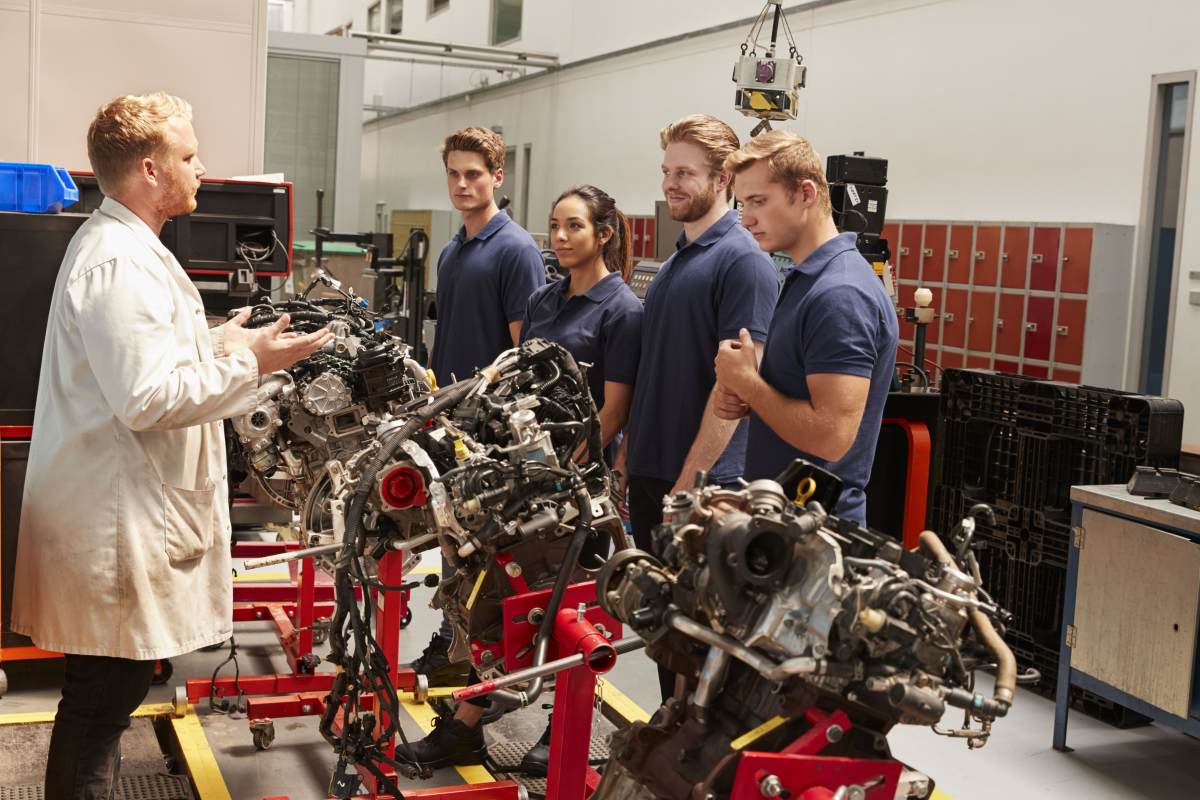
2.1 Self-study vs. specialized training courses
a) Advantages of Self-Study:
- Flexible and Cost-Effective: No need for expensive tuition; you can learn with just some essential books and training equipment, making it budget-friendly.
- Control Over Your Pace: You can study at your own speed, which is ideal for those needing a flexible schedule.
b) Drawbacks of Self-Study:
- Lack of Guidance: Without professional help, it’s harder to get feedback when you run into issues.
- Limited Hands-On Practice: While you can simulate some tasks with training tools, certain advanced skills might be tough to master on your own.
c) Advantages of Professional Training Courses:
- Structured Learning and Certification: Organized lessons and hands-on practice help you quickly build skills, plus you can earn industry-recognized certificates to boost job prospects.
- Career Support: Training programs often have industry connections, providing internships and job recommendations for students.

2.2 Who is Best Suited for Self-Study?
- Car Enthusiasts and Owners: Self-study works well for car owners who are passionate about vehicles and want to cut down on repair costs by learning some basics themselves.
- Learners Needing Flexible Schedules: If you have limited time or need a flexible study schedule, self-study can be a great choice.
- Career Explorers in Automotive Repair: If you’re considering a career in auto repair but haven’t fully committed, self-study can be a useful first step. It allows you to gauge your interest and decide if more formal training is right for you.
For effective self-study, using hands-on automotive training tools like engine models and electrical system boards can create a more realistic learning experience and help reinforce essential skills.
3. Basic Steps for Teaching Yourself Auto Repair
Learning auto repair on your own is a great investment; acquiring this ability not only saves you money on repairs, but it also increases your overall knowledge of autos. Here are some fundamental methods to assist beginners get started in auto repair in a systematic manner.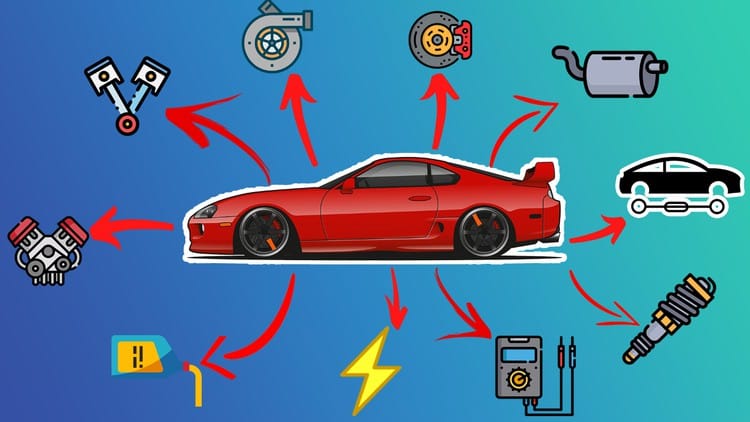
3.1 Begin with Basic Theory
The first stage in self-study car repair is to gain a thorough understanding of basic concepts. Some recommended beginner books and online resources are:
- Recommended Texts: Books like Fundamentals of Automotive Repair and Modern Automotive Technology cover the fundamentals of automotive design, operating principles, and the detection and repair of common issues.
- Online Resources: YouTube offers a large number of car repair tutorial videos that are both informative and easy to understand. Additionally, many websites provide free training, covering everything from the basics to more advanced skills.
Using these automotive technician training tools, students can more effectively understand the fundamental ideas and practices of vehicle repair.
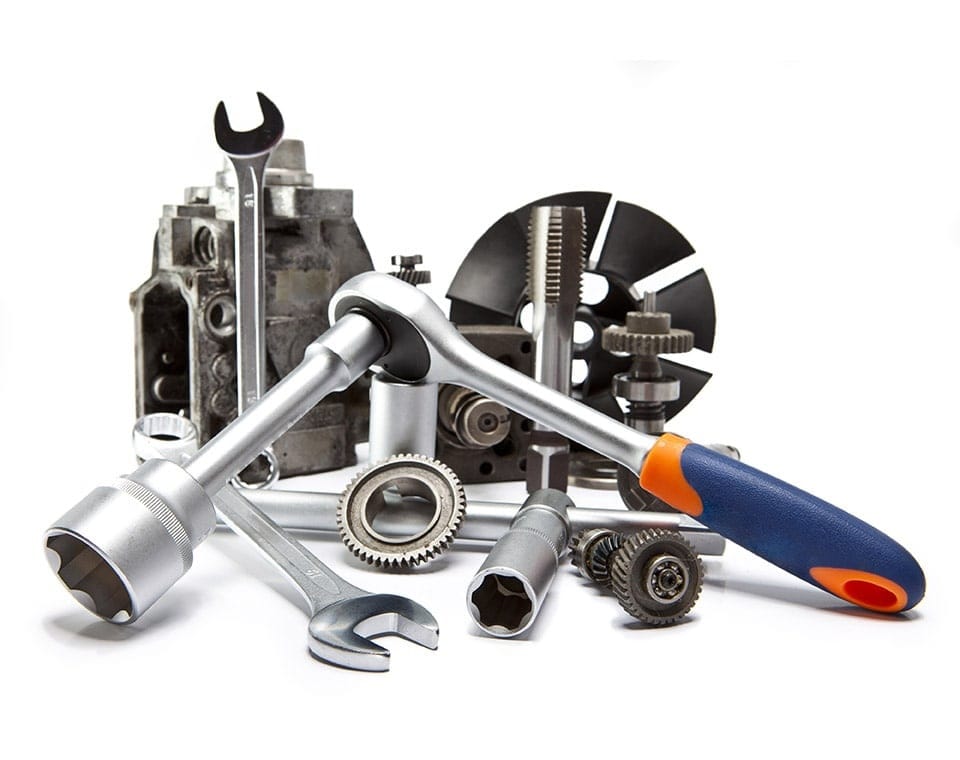
3.2 Basic Tools and Equipment
Having the proper tools is essential when performing car repairs. Here’s a list of some essential tools:
- Wrenches: Includes socket wrenches and torque wrenches.
- Jacks: Used to raise the vehicle for underbody repairs.
- Screwdrivers: Both flat and Phillips head types are needed.
- Oil Pan: For collecting used oil during oil changes.
Additionally, if professional automotive training equipment, such as replicated engine, transmission, and electrical system boards, is available, it can provide learners with a more effective learning experience. These tools simulate a real-world repair environment and allow students to practice safely, helping them improve their hands-on skills.
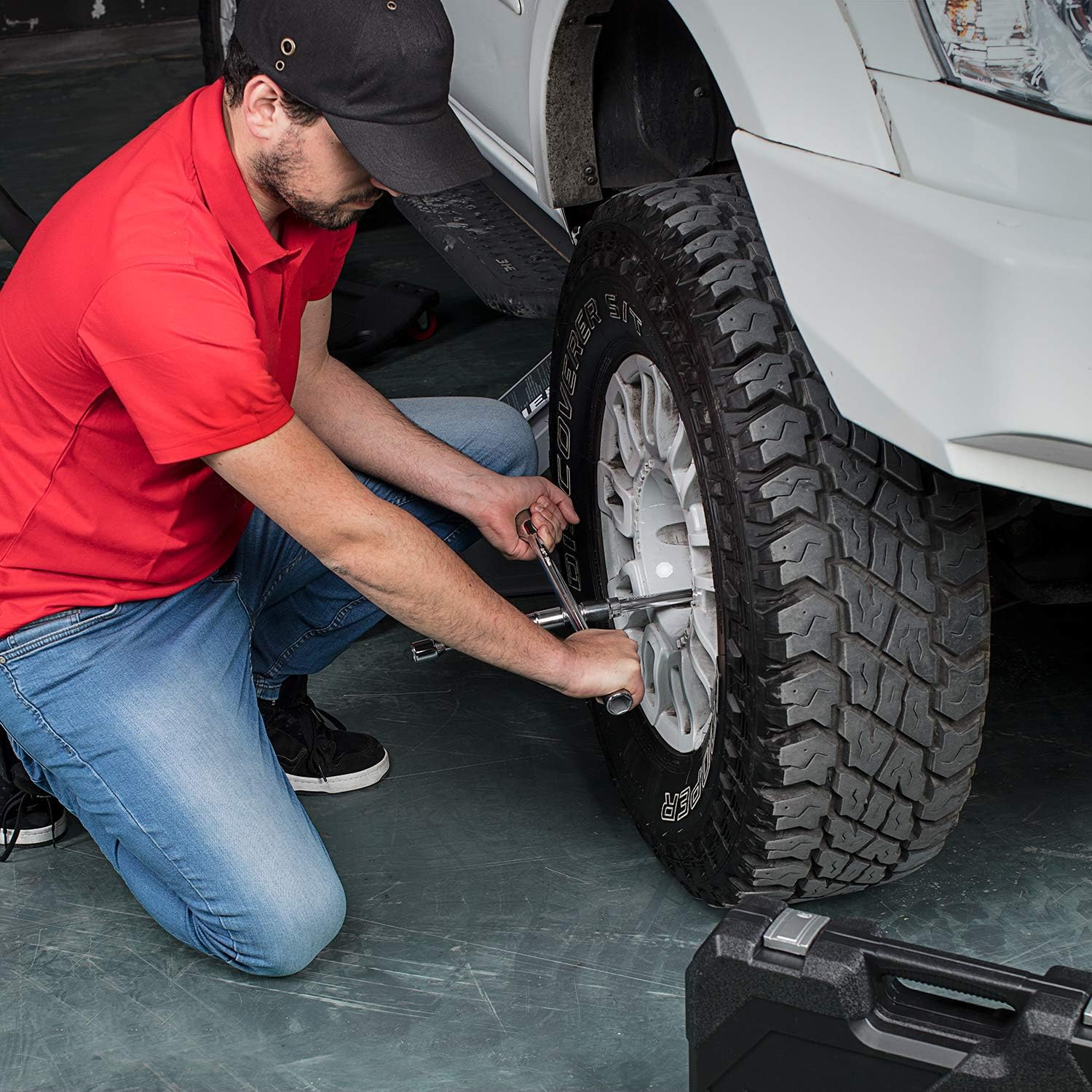
3.3 The Need for Hands-On Practice
Hands-on practice is an essential part of learning vehicle repair skills. Learners should actively participate in practical exercises. Here are some recommended hands-on operations:
- Tire Removal and Mounting: Practice safely removing and mounting tires, and get familiar with using jacks and wrenches.
- Oil Changing: Learn the proper steps for an oil change, including draining old oil, replacing the oil filter, and refilling with new oil.
Only through consistent practice can you enhance your understanding of theoretical concepts and develop strong practical skills. This hands-on approach will make self-study in vehicle repair more systematic and efficient, opening up more opportunities for personal growth.
4. Required Automobile Training Equipment
In the process of learning vehicle repair, having the right training equipment can significantly enhance the learning experience. The right tools allow students to better understand the structure and functioning of a car! Here are some recommendations for essential automobile training equipment:
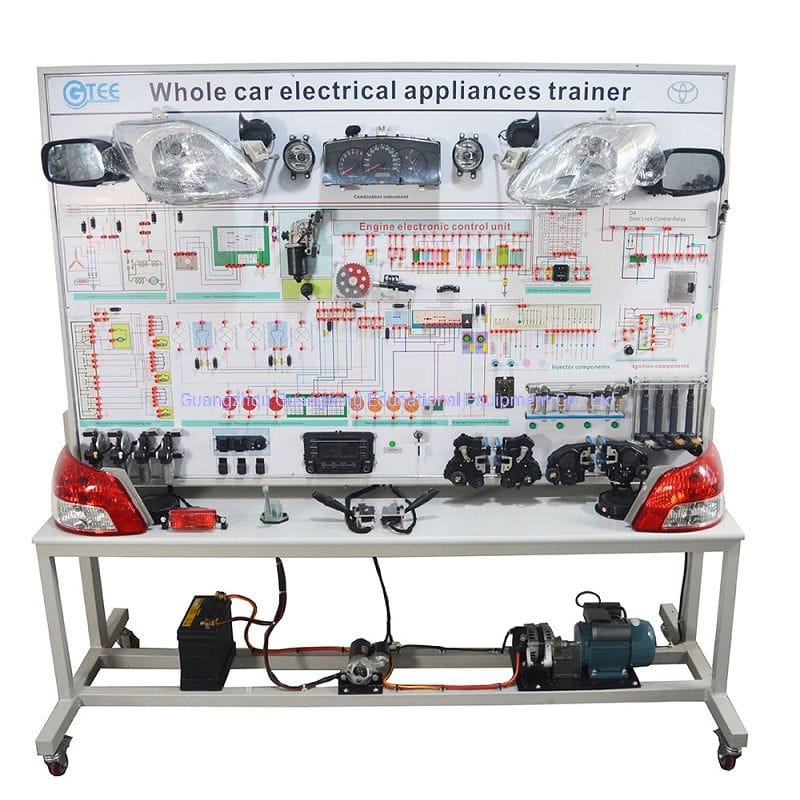
4.1 Types of Equipment
- Engine Model: This type of model helps students gain a thorough understanding of an engine’s internal structure and operating principles. By observing and interacting with the model, students can clearly see how the various components work together and grasp the engine’s essential functions.
- Electrical System Board: The electrical system is a crucial part of modern vehicles, and understanding its circuit structure and operation is vital. The electrical system board models real circuit connections, teaching students about the operation of an automobile’s electrical system and basic troubleshooting techniques.
- Brake and Steering System Models: These models assist students in understanding the functioning of brake and steering systems, along with how to maintain and repair these important components. Through hands-on experience, students will acquire the core skills necessary for safe driving.
4.2 Why Using Training Equipment Helps
The use of specialized automobile training equipment can significantly enhance both learning efficiency and practical skills. These tools are often crafted by experienced manufacturers, ensuring high quality and realistic simulations. This allows learners to experience real-world vehicle maintenance scenarios, even from the comfort of their homes. By mimicking real-world situations, beginners can build their self-confidence and grasp their skills more quickly.
5. Advanced Skills for Self-Studying Automotive Technicians
In your journey of self-studying vehicle repair, mastering some advanced skills will make your learning path smoother and lay a solid foundation for your future career development. Here are some practical tips to help you take your skills to the next level.
5.1 Find Online Communities and Resources
Joining online communities related to automotive repair is a great way to gain knowledge and experience. Forums like Reddit are filled with car enthusiasts and professional technicians sharing their insights and experiences. In these communities, you can:
- Ask questions to experienced professionals and get their valuable advice.
- Connect with other self-learners to share challenges and successes, motivating and supporting each other along the way.
- Stay updated on industry trends and technical advancements, which can be beneficial for your future career.
5.2 Obtain Certifications and Advanced Learning Opportunities
If you want to stand out in the automotive repair industry, getting some relevant certifications is essential. Consider pursuing ASE certification (National Institute for Automotive Service Excellence), which not only proves your technical skills but also makes you more competitive in the job market. Certified technicians usually have an easier time finding good jobs and can earn higher salaries.
Also, don’t forget to take advantage of online courses or attend training sessions offered by automotive manufacturers. These are great opportunities to deepen your understanding of specific automotive technologies or brands. By continually learning, you’ll fill the gaps in your self-study and build a solid foundation for your future career.
5.3 How to Find Suitable Internship Opportunities
Finding the right internship is a crucial step in turning theoretical knowledge into practical skills. Here are some tips to help you connect with professional repair shops or garages:
- Utilize your personal network: Talk to family, friends, or community members to see if they know anyone in the automotive repair industry; you might discover unexpected opportunities.
- Reach out to repair shops: Don’t hesitate to directly express your interest in learning to local repair shops or automotive service centers. Asking about internship or apprenticeship opportunities can often impress shop owners with your enthusiasm and eagerness to learn.
- Attend industry events: Participate in car shows, technical seminars, or career fairs. These are excellent opportunities to network with professionals in the field, helping you expand your professional connections and increase your chances of finding internship opportunities.
By using these advanced skills, you can continually improve your automotive repair abilities and pave the way for your future career. Remember to learn through practice, challenge yourself, and believe that you’ll find your place in the automotive repair industry!
6. Common Questions About Self-Studying Automotive Technology
As you embark on your journey to self-study automotive repair, you might come across some common questions. Here are some answers to frequently asked questions that can help you move forward with confidence.
6.1 Can I Become a Professional Automotive Technician Through Self-Study?
Absolutely! Many successful automotive technicians have taken the self-study route. However, it’s important to know that this process requires time and patience. The field of automotive repair encompasses a wide range of knowledge and skills, so be prepared to put in the effort. Setting up a learning plan can be incredibly beneficial. Regularly assess your progress and keep your curiosity alive—staying eager to learn new things is key to becoming a professional technician.
6.2 What Basic Equipment Should I Invest In?
Before diving into self-study, investing in some essential tools and equipment is crucial. Here’s a quick list of basic equipment along with estimated budget ranges:
- Wrench and Screwdriver Set: These are fundamental tools for car repairs, with a budget of around $30 to $100.
- Jack and Jack Stands: Necessary for lifting vehicles during repairs, expect to spend about $50 to $150.
- Diagnostic Tools (OBD-II Scanner): This handy tool helps you diagnose car problems, ranging from $20 to $200.
As a beginner, start with these basic tools. As your skills grow, consider investing in more specialized equipment like engine simulators or electrical system training boards to enhance your learning experience.
6.3 How Can I Find Reliable Learning Resources?
Finding trustworthy learning resources is crucial. Here are some recommendations to help you carve out your learning path:
- Free Resources: YouTube is packed with excellent automotive repair channels like ChrisFix and Scotty Kilmer. They offer a wealth of beginner-friendly tutorials to get you started.
- Paid Resources: If you’re looking for a more structured approach, check out online course platforms like Coursera or Udemy. They offer professional automotive repair courses, typically priced between $20 and $200. These courses provide both theoretical knowledge and practical video guidance.
With these tips, I hope to answer some of your questions and guide you on your learning journey. Remember, self-studying automotive repair is a gradual process, so stay patient and persistent. With dedication, you’ll definitely become an outstanding automotive technician!
7. Choosing the Right Automotive Training Equipment Supplier
When you’re diving into self-studying automotive repair, picking the right training equipment supplier is super important. Here are some key factors to consider that can help you find the best partner for your learning journey.
7.1 The Importance of Choosing a Professional Manufacturer
Opting for a professional automotive training equipment manufacturer ensures that you get high-quality learning tools. Quality equipment not only enhances your understanding of vehicle structure and repair techniques but also boosts your learning efficiency. For instance, Guangdong Zhongcai Education Equipment Co., Ltd. has been dedicated to the research and production of automotive training equipment since its establishment in 2014. We’re committed to providing reliable products, ensuring that every learner receives the best training experience possible.
7.2 Advantages of Our Automotive Training Equipment
Our automotive training equipment comes with several standout advantages. First and foremost, our equipment delivers precise simulation effects, allowing learners to practice in realistic scenarios, which greatly enhances the intuitiveness and effectiveness of learning. Additionally, our stringent quality control system guarantees the durability and stability of each product. With certifications like ISO9001, our equipment meets modern educational needs, helping learners master skills more quickly in hands-on situations.
7.3 Custom Equipment Options
We understand that every client has unique needs, which is why offering customized equipment options is essential. Whether you’re a school aiming to align with a specific curriculum or an individual with long-term learning goals, we can tailor equipment to your specifications. This flexibility not only sharpens the focus of your learning but also allows each learner to study effectively in an environment that suits them best.
In summary, selecting the right automotive training equipment supplier is a crucial step toward achieving success in your self-study of automotive repair. With years of industry experience and a professional R&D team, Guangdong Zhongcai Education Equipment Co., Ltd. looks forward to being your partner in this learning journey, providing you with the highest quality automotive training equipment.
8. Conclusion: The Future of Self-Learning Automotive Repair Skills
Self-learning automotive repair skills is not just a personal growth journey; it’s a promising career choice. With the rapid advancement in the automotive industry, the demand for skilled technicians continues to rise. By taking the initiative to learn these valuable skills, you will position yourself advantageously in the job market.
We encourage all learners interested in automotive repair—whether for personal enjoyment or career advancement—to delve deeper into self-study paths. Mastering automotive repair knowledge and skills will not only save you money on repairs but also enhance your understanding of vehicles, equipping you to tackle future challenges confidently.
At Guangdong Zhongcai Education Equipment Co., Ltd., we recognize the importance of education and are committed to providing top-quality automotive training equipment. Our products are designed to support your skill enhancement and career development, helping you thrive in this evolving industry. Whether you’re learning at home or in a professional educational setting, we look forward to contributing to your growth. Keep striving for excellence, and success in the automotive repair field will be within your reach!

